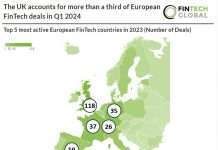Founded in 2014, FinTecSystems is specialised in open banking infrastructure and data analysis to help companies make data-driven and automate decisions. At a time when companies are scrambling to protect their assets from criminal actors, could FTS’ open banking infrastructure be a flood barrier against the rising wave of financial crime?
While FTS is almost a decade old, the idea for the company has roots much further back. According to FTS VP for Ident and RegTech Martin Schmid, the creation of the company goes back almost 15 years in the payment market. The founders of FTS previously created a payment solution called Sofort, which is a solution based on a digital bank transfer. Sofort, Schmid remarked, was one of the reasons why there had been a second payments services directive – PSD2 – in Europe, as the first directive was not applicable on services like bank transfers.
He said, “Sofort provided and managed all the interfaces to different banks all over Europe, and by having these interfaces, it was possible for every customer that has a bank account to initiate a direct payment from a merchants ecommerce shop to their recipient bank account without the need of leaving the website. Long story short, this solution was based on having access to any kind of bank account, but it was only used for bank transfers.”
These restrictions of scale led Schmid and the other FTS founders to set up the new company, after they realised there was a huge lack of choice on the market when it came to automated digital loan applications. When people commonly apply for a loan, they need to verify they are able to pay the money back by sending salary slips and account statements – methods that are regularly very manual and paper-based.
This realisation led to the idea that FTS could use and utilise the interfaces that had been used for initiating a payment to also use for retrieving bank information to speed up and help loan applications become more automated. Schmid said, “Everything you need to verify your creditworthiness is within your bank account – such as your salary and your rent – so this was the basic idea behind FTS. We founded FTS to democratise and accelerate loan applications or any kind of financial product where you need to verify your credit worthiness.
“Over time, we realised that our solution could also be used and utilised not only within a loan application or application for a financial product, but also for preventing compliance risks, fraud risks and KYC processes amongst other things.”
Open banking to fight fraud
FTS’ use of open banking technology can be used to not only help companies make better data-driven decisions, but also provide a stronger foundation of security. At a time when financial crime is seeing a growing presence across a vast range of industries, many companies are rushing to put forward their own solutions for tackling this issue. Could open banking prove to be the silver bullet for financial crime?
Schmid commented, “There are various ways open banking can help tackle fraud. One example is gaming gambling, where a certain quantity of customers need to verify their financial sources. If you play a lot of money in gaming gambling, you need to prove where the money comes from which you used to do the gambling. From here, you will be asked to send over your salary slips and proof of your rent and income. Currently, users only have a possibility to send this manually.
“With FTS, users can do this by simply logging into their banking account – from here, we can see if a salary is coming in and how much, how it differs from month to month, and any other incomes and see where the income is coming in from. Through our system, you can also verify who is your customer – and as you don’t want them to run into a complex and difficult identity process, you just want them to be able to log into their bank account. So from our platform, we can match the account holder with the gambling customer applicant.”
The company’s open banking platform also allows companies to identity whether a customer is of legal age, without them needing to send in their passport or ID, simply by logging into their bank account. Schmid remarked, “With a certain KPI and algorithm, we can check whether the transaction someone is doing only applies to people over or under 18 – for example, if there is an indication that a person has applied or has certain loan incomes that they need to pay, this would apply is general only for people that are over 18.”
The high-security benefits of open banking can be commonly found in growing sectors such as the buy now, pay later (BNPL) market. The BNPL market has seen powerful growth this past year, with Forbes predicting that consumers will make nearly $100bn in purchases using BNPL programs this year.
Many big players in the market have high acceptance rates with customers – with numbers commonly around 65%-70% of customers being directly accepted without any questions due to them being existing customers. Alongside this, Schmid highlighted that there are 10% of customers which are typically ‘red’ – meaning they are rejected straight away, due to issues such as suspicious purchasing around products, time of purchase and name of purchaser.
He noted this left 20 to 25% who are ‘yellowish’, meaning they were unknown and ‘customers of doubt’ where shop providers may need to ask themselves whether these customers were worth the risk due to their weak proof of identity. On the opposite side, providers may be potentially losing a purchase and a customer in the process. For this thorny issue, Schmid believes open banking can help.
He said, “Open banking can provide companies a second chance to look at these customers. Normally, these customers would be rejected, however these individuals have the possibility of logging into their bank account on our website, where they have the chance to verify their name and their credit worthiness as everything we need is in their bank account. If all of this is okay, we would accept later on as a second that you pay after delivery.”
Acquisition and trends
Earlier this year, Swedish open banking firm Tink acquired FTS for an undisclosed amount. At the time, Tink stated that the purchase acquisition would help strengthen FTS’ already leading market position, with Tink helping the German firm boost its high growth in the DACH region. According to Schmid, the acquisition helped FTS extend the reach of its leadership.
He remarked, “We turned from being a DACH market leader to being a European market leader. Why? Because there are way more banks accessible through the Tink platform, ” Schmid commented that the reason why FTS accepted to the merge with Tink was due to the fact that it would allow the company to roll-out its services through the European continent.
Schmid added that there was a further acquisition through Visa four weeks after the Tink purchase, a deal which he said will enable FTS to not only be a European market leader, but a global market leader. He added, “We will have the connections and the network on a worldwide scope. This in terms of product reach would give us a massive wider product range and reach to our customers.”
In terms of the key trends in the FinTech industry right now, Schmid pinpointed identification and customer onboarding as significant areas.
He said, “The more digital transactions occur, the more fraud that will also take place. So this is why you have that demand for faster, more convenient customer onboarding. You need to identify who is the customer – is it the same person that they say they are? At the same time, you also need to make sure that your solution is safe and secure.
“It doesn’t make sense to just let everyone onto your platform and the accept the fraud and risk problems that come with it. But on the other hand, it isn’t good to just recheck everyone in order to prevent fraud. So, there is that challenge to have maximum acceptance and convenience, but at the same time, maximum security.”
Copyright © 2021 FinTech Global











